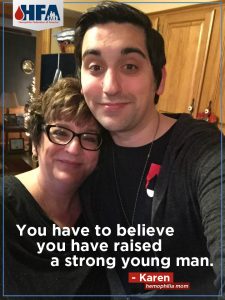
As parents of a nearly twenty five year old son, my husband George and I have enough to write a book about being the parents of a child with severe hemophilia B. There are so many ups and downs raising Michael over the years. Our most recent up and down has been the transition of Michael growing into an adult.
When your baby is born, it is a miracle. Nothing can compare to that feeling. When a doctor tells you that he has hemophilia, your world turns upside down once again. Michael was diagnosed at the age of eleven days. He, like many other hemophiliacs, was diagnosed after his circumcision.
When they are babies, it is typically easy to control what is going on. As they grow and become toddlers, the worry and anxiety begins to set in. I always said if I had a dime for every time my husband gasped out of fear that Michael was hurt, we would be rich! Every tumble and fall brought worry. Is it a bleed? What do we do? As parents, you quickly learn to take control. You have no choice. You learn and then learn some more. You read everything you can get your hands on about hemophilia. You rely on your HTC to help and guide you. But you are in control. You order the factor. You make the decisions. You make the appointments with the doctors. You schedule the surgeries when they need to happen. You spend countless hours in physical therapy with them; hold their hands and hoping they don’t cry so much this time. But, as parents, you are in control. You go to the school and help the teachers learn and understand hemophilia. You hire the babysitter that you can trust. You go on vacations that are safe for your son. You tell the ER doctors what to do. You are in control. Then the transition begins to happen. The child becomes an adolescent. They want to try things on their own. They drive a car! There’s suddenly a whole new set of scary things for you as a parent to face. You don’t control everything they do. They leave your sight! They want to go hang out and spend the night somewhere else. Your HTC begins to stress the importance of self-infusions, yet you don’t really understand; Why should he do it when I can? I am in control! Or at least you thought you were!
Then the transition begins to happen. The child becomes an adolescent. They want to try things on their own. They drive a car! There’s suddenly a whole new set of scary things for you as a parent to face. You don’t control everything they do. They leave your sight! They want to go hang out and spend the night somewhere else. Your HTC begins to stress the importance of self-infusions, yet you don’t really understand; Why should he do it when I can? I am in control! Or at least you thought you were!
Suddenly, you blink your eyes and college is upon you and your child. How and when did that happen? If you are lucky, like we were with Michael, they choose a university close to home. So all is good and you breathe a sigh of relief. You are still in control.
Then, they graduate! And this time, your child is no longer directly under your supervision. You pray you have done enough. Do they self-infuse well enough? Do they know how to order their factor? Will they run out? Will they take it with them when they travel? Will their new employer understand about hemophilia? Will they lose their job when they can’t make it to work?
Who will make sure this is all done? You have to believe you have raised a strong young man. You have to believe in him.
They have been with you for over two decades. They know the right thing to do and you have been the one to teach them. You have to let go. This is a new chapter in all parent’s lives. When you are the parent of a hemophiliac, it is a bit different. Letting go is never easy, but we can help them and ourselves make that transition easier. Help them prepare. Help them go out and start a new life without you. Give them the tools, knowledge and give them the love and support.
Karen, her husband George, and her adult son, Michael, live in Ohio.
*Note: “Infusing Love: A Mom’s View,” is a blog collection of personal opinions and a representation of individuals experiences. While extensive efforts are made to ensure accuracy of the content, the blog entries do not represent HFA or its Board of Directors. The blog is also not intended to be construed as medical advice or the official opinion/position of HFA, its staff, or its Board of Directors. Readers are strongly encouraged to discuss their own medical treatment with their healthcare provider.



